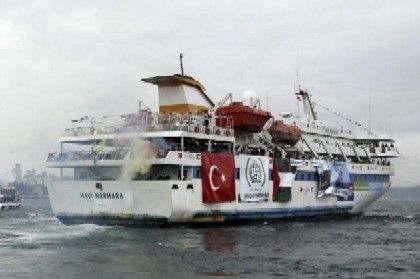Niyazi Dalyancı
Turkey’s leadership was still discussing how to react to Israel’s bloody attack on the Turkish liner “Mavi Marmara” that left nine people dead while heads of state and government from the members of Conference on Interaction and Confidence Building Measures in Asia (CICA) including Russian Prime Minister Vladimir Putin, Ahmadinejad of Iran, Presidents of Azerbaijan and Afghanistan, Elham Aliyev and Hamid Karzai and Palestian Mahmoud Abbas converged in Istanbul for their fifth summit meeting. Israel, also a member of CICA was conspicuously absent from the summit.
Israel’s attack on the ship carrying relief materials for Gaza along with five other ships from other countries forming the Gaza Peace Flotilla naturally dominated the statements made by the political leaders taking part in the summit.
Putin, at a news conference with his Turkish counterpart Tayyip Erdogan pointed out that the fact that the Israeli raid took place in the international waters “worthy of concern.” “The incident should be dealt with at the United Nations,” said the Russian prime minister.
Mahmoud Abbas, the President of the Palestinian administration described the Israeli attack as a “massacre of civilians,” and Ahmedinejad claimed “the raid is the beginning of the countdown for Israel’s destruction.”
However, judging from the statements made by Turkish leaders, there was no clear plan how Turkey would react to Israel.
“Israel will definitely pay for our dead,” declared Erdogan, while President Abdullah Gul adopted a milder attitude saying, “We shall never forgive Israel unless they come up with an acceptable rectification.”
Over the weekend, deputy chairman of the ruling Justice and Development Party (AKP), Omer Celik said during a television program that military cooperation agreements with Israel will be nullified. Defense Minister Vecdi Gonul answering questions over Celik’s declaration referred the subject to the Foreign Ministry saying it does not come under his responsibility.
Finally, Foreign Minister Ahmet Davutoglu said that the government was looking into this matter and the “outcome will depend on Israel’s attitude.”
Lack of support from Turkey’s allies
In the wake of the Israeli attack, Turkey complained about the lack of wholehearted support from its western allies, mainly the United States. After a telephone conversation with the U.S. Secretary of State Hillary Clinton, Davutoglu said: “Speaking openly, Washington’s declaration yesterday did not please us. We were expecting an outright condemnation.”
But more to come from Washington for Ankara’s displeasure; replying to Erdogan’s repeated assertions that he does not see Hamas as a terror organization, the spokesman of the U.S. State Department, Philip Crowley during Monday’s press briefing replied to a question saying that, “U.S. has categorized Hamas as a terror organization. Our view regarding this is quite clear.”
The relief mission was organized by an Islamic charity organization called IHH that is active in some 100 countries including Germany where it takes its acronym from: Internationale Humanitaere Hilfsorganisation.
Israel’s Prime Minister Binyamin Netanyahu claimed that there were Hamas militants on board the Mavi Marmara and they attacked the Israeli commandos trying to lynch them; though he was not able to produce any solid evidence for his claims.
Fethullah Gulen disagrees with IHH’s conduct
Gulen, an Islamic preacher, has been living in Pennsylvania, U.S. since 1999 and he has been extending full support to the AKP government since 2007.
Gulen in a critically-timed interview published in The Wall Street Journal on June 4 declared his disapproval of the way the relief operation was conducted. “What I saw was not pretty, it was ugly,” Gulen told the WSJ. He added that the relief organizers’ failure to seek Israel’s accord before delivering relief material “is a sign of defying authority, and it will not lead to fruitful matters.”
Gulen movement, as it is called in Turkey, runs an empire of some 500 schools and universities in Asia, Africa and even in Europe and it also has a powerful media group including daily newspapers, magazines, television channels. Leading Turkish intellectuals, academics and journalists attend seminars and meetings organized by associations linked to the movement. In 2008 Gulen was cleared of charges that he was heading an organization that was seeking to set up an Islamic state in Turkey.
In his interview with the WSJ, Gulen did not hesitate to cast doubt on the IHH, the Islamic charity organization that planned the so-called “Gaza freedom flotilla.” Gulen told the WSJ that he has only recently heard of IHH which is active in more than 100 countries according to the newspaper and said, “It is not easy to say whether they are politicized or not.” He went further to add that assigning the blame for Israel’s bloody attack that left nine Turks dead should better be left to the United Nations.
Gulen’s comments run counter to the atmosphere dominating especially in the Turkish government circles where an openly bellicose discourse against Israel is running high. “The fate of Jerusalem is not separable from the fate of Istanbul, the fate of Ramallah is not separable from the fate of Ankara,” said Erdogan at a public rally in Konya during the week. He also accused the critics of IHH in the Turkish press as “the partners of Israel’s international media.”
What’s in store in near future?
Although there is a lot of fiery talk against Israel and the incident sparked street protests, it is still unclear how Turkey will react to it. Foreign Minister Davutoglu’s address to the Islamic Organization Conference does not allow us to have any concrete clue in what way Turkey would steer its course. But as Davutoglu said, “Nothing will be the same as before.”
He said:
“For the first time in the history the citizens of the Turkish Republic were killed by the soldiers of a foreign country. Israel’s action incorporates all the crimes that come under premeditated murder, piracy, hostage taking and robbery. This is state terror. This single incident has been a turning point in the history of this region. This has been our 9/11 which will have deep repercussions in our approach both to the regional and global matters.”

